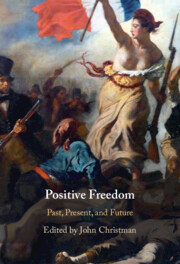Book contents
- Positive Freedom
- Positive Freedom
- Copyright page
- Contents
- Contributors
- Acknowledgments
- Introduction The Multiple Dimensions of Positive Freedom
- Chapter 1 Unity and Disunity in the Positive Tradition
- Chapter 2 Positive Liberty as Realizing the Essence of Man
- Chapter 3 Moral and Personal Positive Freedom
- Chapter 4 Positive Freedom and Freedom of Contract
- Chapter 5 Recognition and Positive Freedom
- Chapter 6 Self-Mastery and the Quality of a Life
- Chapter 7 Basic Freedom in the Real World
- Chapter 8 Reframing Democracy with Positive Freedom
- Chapter 9 Disability and Positive Liberty
- Chapter 10 Positive Freedom and Paternalism
- Chapter 11 Beyond Positive and Negative Liberty
- Chapter 12 Property and Political Power
- Chapter 13 Public Reason, Positive Liberty, and Legitimacy
- Works Cited
- Index
Chapter 6 - Self-Mastery and the Quality of a Life
Published online by Cambridge University Press: 03 September 2021
- Positive Freedom
- Positive Freedom
- Copyright page
- Contents
- Contributors
- Acknowledgments
- Introduction The Multiple Dimensions of Positive Freedom
- Chapter 1 Unity and Disunity in the Positive Tradition
- Chapter 2 Positive Liberty as Realizing the Essence of Man
- Chapter 3 Moral and Personal Positive Freedom
- Chapter 4 Positive Freedom and Freedom of Contract
- Chapter 5 Recognition and Positive Freedom
- Chapter 6 Self-Mastery and the Quality of a Life
- Chapter 7 Basic Freedom in the Real World
- Chapter 8 Reframing Democracy with Positive Freedom
- Chapter 9 Disability and Positive Liberty
- Chapter 10 Positive Freedom and Paternalism
- Chapter 11 Beyond Positive and Negative Liberty
- Chapter 12 Property and Political Power
- Chapter 13 Public Reason, Positive Liberty, and Legitimacy
- Works Cited
- Index
Summary
This chapter construes positive freedom as an ideal of individual self-mastery.So understood, positive freedom concerns internal factors that, in Isaiah Berlin’s words, “determine someone to do, or be, this rather than that?”Self-mastery is a matter of being determined in the right ways by these internal factors.This chapter first explains how self-mastery contributes to the quality of the lives of those who achieve it.It does so in different, but complementary ways, ways which have not been distinguished or adequately appreciated in the literature on the topic.The chapter next argues that self-mastery is one component of the kind of freedom that a well-functioning state ought to promote in its members.Self-mastery is an individual achievement, but the state can promote it by establishing conditions that facilitate its realization.In presenting these arguments, the chapter rejects the view – sometimes advanced by proponents of positive freedom – that the value of external negative freedom is reducible to its contribution to positive freedom, but it concurs with the view – often advanced by proponents of positive freedom – that the state’s concern with freedom should not be limited to external factors, such as constraining coercion or ensuring that all have access to an adequate range of options.
Keywords
Information
- Type
- Chapter
- Information
- Positive FreedomPast, Present, and Future, pp. 102 - 119Publisher: Cambridge University PressPrint publication year: 2021
